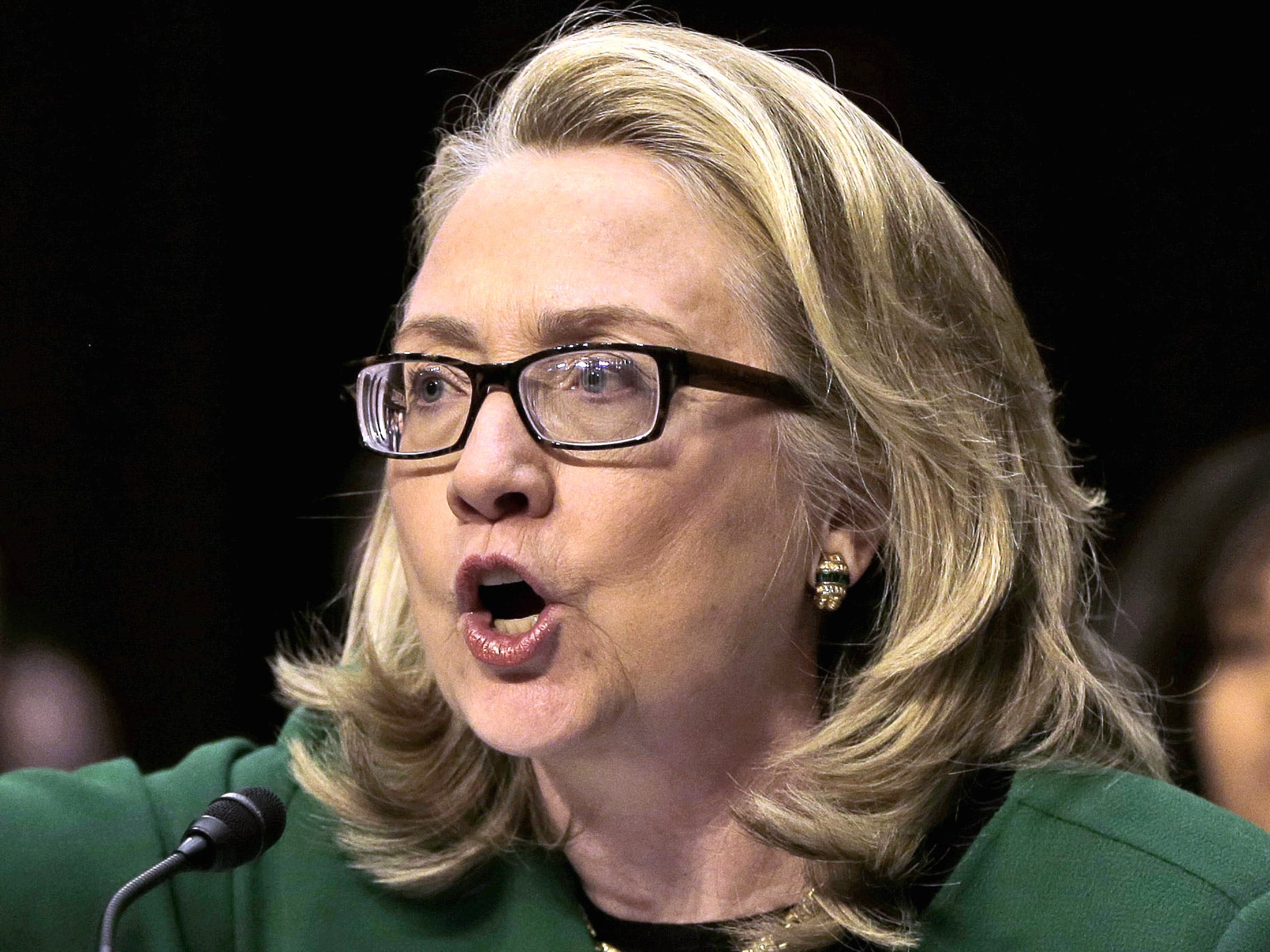Emotional and angry, Hillary Clinton faces her accusers over Benghazi attack
Mistakes, but no cover-up: outgoing Secretary of State defends handling of embassy raid

Your support helps us to tell the story
From reproductive rights to climate change to Big Tech, The Independent is on the ground when the story is developing. Whether it's investigating the financials of Elon Musk's pro-Trump PAC or producing our latest documentary, 'The A Word', which shines a light on the American women fighting for reproductive rights, we know how important it is to parse out the facts from the messaging.
At such a critical moment in US history, we need reporters on the ground. Your donation allows us to keep sending journalists to speak to both sides of the story.
The Independent is trusted by Americans across the entire political spectrum. And unlike many other quality news outlets, we choose not to lock Americans out of our reporting and analysis with paywalls. We believe quality journalism should be available to everyone, paid for by those who can afford it.
Your support makes all the difference.In her last public act as America's diplomat-in-chief, Hillary Clinton confronted her critics on Capitol Hill today, defending her handling of last year's assault on the US consulate in Benghazi and fiercely rejecting all notion of a cover-up in the days that followed it.
If Republicans had been hoping to clip Ms Clinton's wings as she prepares to step down as Secretary of State – and hurt her chances of running for president in 2016 – they were probably disappointed.
Instead, she took the initiative to acknowledge errors made in the run-up to the killing of Ambassador Christopher Stevens and three others and dismiss claims that she had tried to mislead the nation about what had happened.
She notably became irate when Ron Johnson, a Tea Party-backed Senator from Wisconsin, pressed the cover-up theme, quizzing her on the length of time the administration took to acknowledge that the attack was the work of terrorists and not an outgrowth of a street protest over an American anti-Islam video.
The exchange with Senator Johnson cut to the heart of the hearings that had been delayed for several weeks to allow Ms Clinton to recover from a blood clot in the brain.
Did the administration try to obscure the terrorist nature of the attack which killed the US Ambassador to Libya, Christopher Stevens, to minimise possible damage to Barack Obama as he sought re-election?
“The fact is we had four dead Americans,” she said, gesticulating angrily. “Was it because of a protest? Or was it because of guys out for a walk one night who decided they'd go kill some Americans? What difference, at this point, does it make?… People were trying in real time to get to the best information.”
As she was testifying, the Pentagon revealed that it was lifting all restrictions on US women serving in the front line of conflicts overseas. Ordered by outgoing Secretary of Defence, Leon Panetta, it is a ground-breaking decision that lifts curbs on combat roles for women first imposed nearly 20 years ago.
In her opening statement, Ms Clinton, whose original appearance before the committee last month was delayed when she suffered complications from a concussion, showed unusual public emotion as she recalled those days after the attack.
“I stood next to President Obama as the Marines carried those flag-draped caskets off the plane at Andrews,” she recalled, her voice cracking. “I put my arms around the mothers and fathers, sisters and brothers, sons and daughters.”
She told the senators that the State Department is enacting all of the 29 recommendations contained in an independent review board report into the attack, which focused in particular on why appeals for more security from the ground in Benghazi in the months ahead of it had gone ignored by Washington.
Ms Clinton used her time at the microphone to also underscore the growing concern in Washington about events in North Africa generally. In that context, she spoke of Mali and the terror attack in Algeria. In both instances, she said, guns coming out of Libya were implicated.
“Benghazi didn't happen in a vacuum,” she said. “The Arab revolutions have scrambled power dynamics and shattered security forces across the region and instability in Mali has created an expanding safe haven for terrorists who look to extend their influence and plot further attacks of the kind we saw just last week in Algeria.”
While Ms Clinton said she accepted ultimate responsibility for the fact that the Benghazi facility had been insufficiently protected, she rejected claims she should have known about security requests that went ignored. “I didn't see those requests, they didn't come to me, I didn't approve them, I didn't deny them,” she said.
Subscribe to Independent Premium to bookmark this article
Want to bookmark your favourite articles and stories to read or reference later? Start your Independent Premium subscription today.
Join our commenting forum
Join thought-provoking conversations, follow other Independent readers and see their replies
Comments